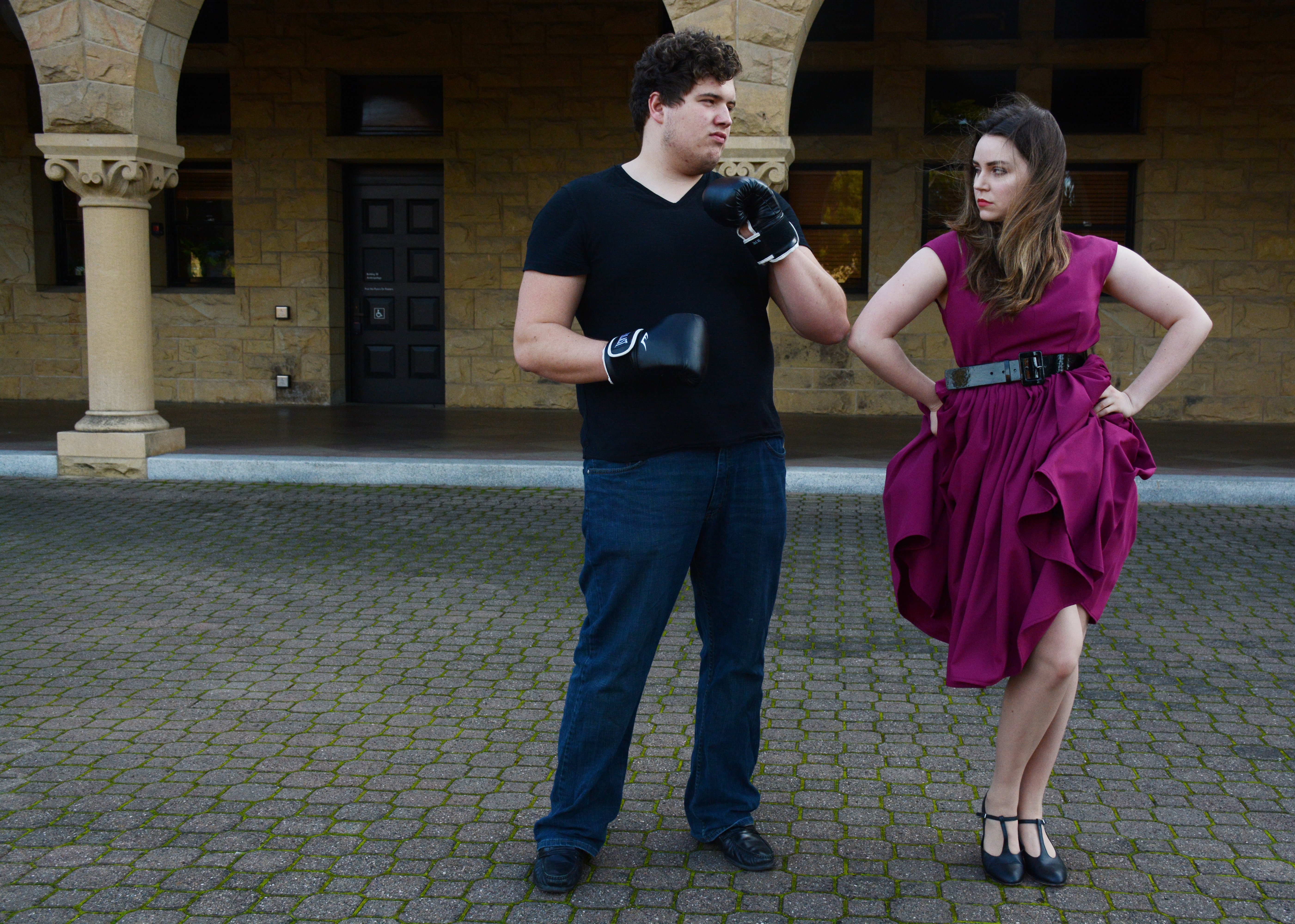“Trouble in Tahiti,” which opened this past weekend as part of the Stanford Savoyards’ “Leonard Bernstein Double-Bill,” addresses many important issues regarding life, love and the crushing gloom that so often comes hand-in-hand with middle-class American values. Originally written by Bernstein in 1952, the show follows the story of a middle-aged married couple who, surrounded by all the wealth and luxury they could ever want, simply can’t find a way to be happy.
The scene is a familiar one: a cheerfully decorated kitchen, complete with all the up-to-date appliances of the beat generation. A trio of singers, dressed to the nines in charming blue tuxedos, sing a campy tune about life in the “little white house” in the heart of Suburbia – in this production, the lines of the song switch interchangeably from “Burlingame,” to “Menlo Park,” to “Redwood City,” to “San Mateo,” and back again. Above them, a projector screen displays kitschy images of such a home (though often the twenty-first century residences feel a bit anachronistic in light of the play’s otherwise old-fashioned aesthetic).
Center stage we see Dinah (Danielle Smith ‘16) and Sam (Kyle Efken ‘17) sitting across from one another at their dining room table: the seemingly perfect pair. But from the moment they open their mouths, it becomes apparent that this family is anything but functional. As we see so often in the quintessential post-war marital trope, Sam makes passes at his secretary and refuses to be present for his son’s extracurricular activities, while Dinah feels isolated in her lonely lifestyle as a stay-at-home wife. The two argue incessantly, constantly lamenting the love they once shared, but which has long since receded into the distant past.
Musically, there are many things to be appreciated. The orchestra – while overpowering at times – does a wonderful job of staying true to Bernstein’s artistic vision, and both Smith and Efken deliver powerful performances. Smith is specifically enchanting, with a delicate, mellifluous vocal quality which allows her to hit impressively high notes while maintaining the sweetness of her domestic persona. In a melancholic song about her crumbling relationship with Sam, she sings: “A woman needs so little – a little feeling of warmth, a little feeling of home.”
The dilemma between the two as they struggle to avoid spending another hour together despite the shallow interests which connect them – their love for the same music, the same parties – places us in the midst of what they call a “screaming silence.” Desperate to keep their illusion of merriment intact, they resort to go to the cinema together to watch a movie entitled “Trouble in Tahiti,” a classic American picture that feeds audiences silly stories about adventurous love affairs, all wrapped up in the bizarre brand of racism which emerges whenever Hollywood attempts to portray exotic, indigenous characters. The film is a cheap shot at the happiness both Dinah and Sam seek, replacing the magic of their young love with “the other magic – the bought and paid for magic” created by the glowing screen.
While there are many allusions to a beautiful and romantic past shared by the two parties, we are never shown – either technically or directorally – any hints of what this may have looked like, and are left trying to process the self-pitying soliloquies of both characters with no ability to contextualize the how and when and why of their failed marriage. The unfortunate result of this is that both characters fall flat; Sam is shown as inconsiderate and brutish, singing about money at his office desk and pummeling punching bags at the gym – while Dinah, slightly more nuanced, still emerges looking helpless, with no interests outside of her little white house. And despite the emotional core that holds the show together, as an audience, it is only possible to observe the boredom of others for so long before becoming bored ourselves.
Thus, though the opera may have made important political strides at the time of its debut, much of the novelty of Bernstein’s critiques are lost in a more modern setting. In this day and age, it is no longer enough to simply portray the stifling emptiness of upper middle-class life; instead, we must create characters who are fully developed, relatable and able to be situated within broader historical and social processes – and who embody both the hardships and the privileges that come with wealth. While both the textual and directorial choices in “Trouble in Tahiti” address the former, the latter is left out of the show completely, making it impossible to glean a nuanced perception of who Sam and Dinah are, and why their stories matter. In the end, I was left feeling neither sympathetic nor properly critical of their actions but perhaps, if anything, even more frustrated by the narcissism of Suburban aristocrats than ever before.
Contact Madelaine Bixler at mbixler ‘at’ stanford.edu.
